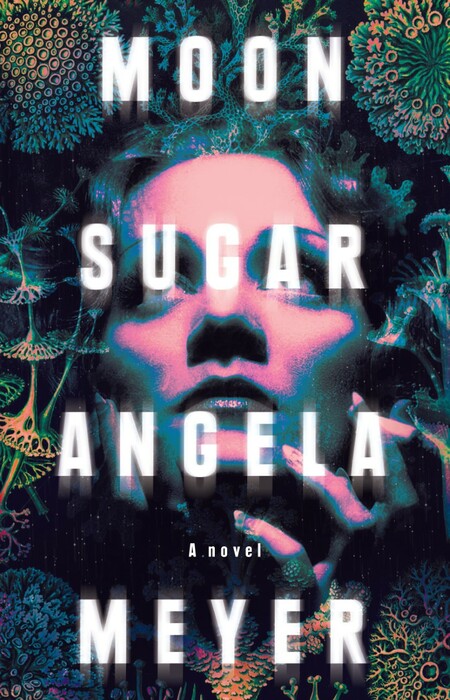There is something thrilling about a writer who is so acrobatic in their writing style and so skilled at their craft that they can handle a number of ideas and genre leaps in the one novel and never have it feel for a second like it’s a literary Frankenstein.
Such a writer is Angela Meyer whose novel Moon Sugar manages to bring together a missing person/suicide mystery, rumination on grief and loss, existential angst about what we are expected to have achieved in life to feel good about our time on earth, and some intensely clever sci-fi ideas, the exact nature of which must be left to the reading lest the enthralling surprising elements lose their impact and sheen.
That’s a lot to cram into one novel but Meyer makes it look effortless, primarily because from the word go, she goes to an intense amount of trouble to establish who the main characters are and why we should care so much about them.
Good writers do that as a matter of course and Meyer is no different, but here getting the characters fully-realised and vividly leaping off the page, even at their darkest and most morose, and with a sense of brokenness and loss hanging over them much of the time, is vitally important because it has a profound influence on how we handle the novel’s later, more outlandish elements.
Because we know who these people are, and why they matter in such richly intimate detail, the rest of the narrative really hits home quite powerfully, its thoughtful and full speed ahead genre-hopping feeling quite human and grounded for all its many leaps and bounds.
As she [Mila] walks, she can’t imagine what she will do next. Right now, but also tomorrow, the next day. How can she work? How can she put food in her mouth? How can she makes sounds from her throat?
…
She makes it home, to her small southside apartment, and she crawls into bed and sobs, until she passes out. (P. 8)
And leaps and bound of the most gloriously, exciting and emotionally impactful there most certainly are.
As Moon Sugar begins its beguiling intense journey into the human soul, and around the world – the story takes place in a number of Europeans cities including Berlin and Prague, and Melbourne, Australia – we meet Mila, a personal trainer barely making ends meet, as she finds out that her “sugar baby”, Josh, a younger sex worker who’s come to mean a great deal to her is missing, presumed dead, in Berlin.
His backpack and a note have been left by a river and after the initial shock and grieving wear off, Mila is seized by an irrational sense that Josh, against all evidence to the contrary is very much alive.
The same sixth sense of hopefulness, near certainty, seizes Josh’s housemate and best friend Kyle who decides to head to Europe on the joint trip he’d planned with Josh, if no other reason that he can’t think of what else to do in that moment.
He and Mila don’t know each other at that point but events quickly bring them together, both of them searching for evidence that supports this lingering sense that something is not quite right when it comes to Josh’s disappearance, that it all looks to neat and convenient to fit with the narrative being advanced by authorities.
It’s here that Moon Sugar, which has already proven itself to be the work of a masterful storyteller who artfully blends affectingly good, authentic characterisation with slow-burn events that lure you in and keep you turning the page with fiendishly intense curiosity, really gets going.
Balancing darker and light elements that work together to create a compelling sense of mood and time and place, Moon Sugar begins its genre racing with alacrity, going deep to explore how we react in the face of loss and fear of what our lives will or won’t be, and especially, what form they will take without that one person that gave them real meaning, and whether that voice we hear deep down at times of harrowing misfortune has anything worthwhile to say.
In the case of Mila and Kyle it does, and as they delve into what Josh was doing in Europe, and who he was with, from friends to clients, it becomes increasingly clear that that voice that Mila and Kyle are heeding has got some important things to say that must be heeded.
There are moments, of course, when the two new friends question their sanity and good judgement, which is to be expected in such a charged atmosphere, and it’s these moments of raw, painful questioning, and the acting out they engender, that further grounds Moon Sugar into a very human place where its wilder elements have an emotional resonance they might not otherwise possess.
She [Mila] stands, half-jogs into the Pergamon Museum. Kyle is sitting on a bench, stopped over his phone, surrounded by marble. She grabs his shoulder.
‘What’s wrong?’ he says, alarmed.
‘I don’t think Josh is dead at all. (P. 109)
For its vivacious imaginative elements and pedal-to-the-metal narrative, Moon Sugar is at heart a richly rewarding exploration of what humanity looks like when it’s in the very worst of place, and the loss of someone precious is pretty much one of the worst places anyone can ever journey to.
It combines this bleakness and loss with a hopefulness that perhaps things aren’t as bad as they appear – they are very, very bad which is why you can well understand why Mila and Kyle wonder if they are doing the right thing on many occasions – and a resilience of spirit that takes more than its share of battering, internally as Mila and Kyle question their motives and needs over and over, and externally as evidence, initially at least, points to the fact that Josh is every bit as dead as the everything suggests.
If you have ever wondered how resilient we can be as people, even in the fact of trauma and grief, then Moon Sugar provides an answer, one that keeps in mind that we live in a fallen, broken world, but that this doesn’t that any hope we possess is ill-founded and that any attempts we make to act on that hope are foolish.
To find out if Mila and Kyle’s leap of faith is justified, you will need to read this very fine book, which immerses you into the thick of the action and the very heart of the best and worst times of the human condition, with a vivaciously original flair that seamlessly takes some staggeringly clever ideas and some grounded realities about life and brings them together in a story that is infinitely, fantastically relatable and which, even in its wildest moments, never strays from who we are as possible, who we long to and who we might become if we just have enough faith … for all kinds of things.

